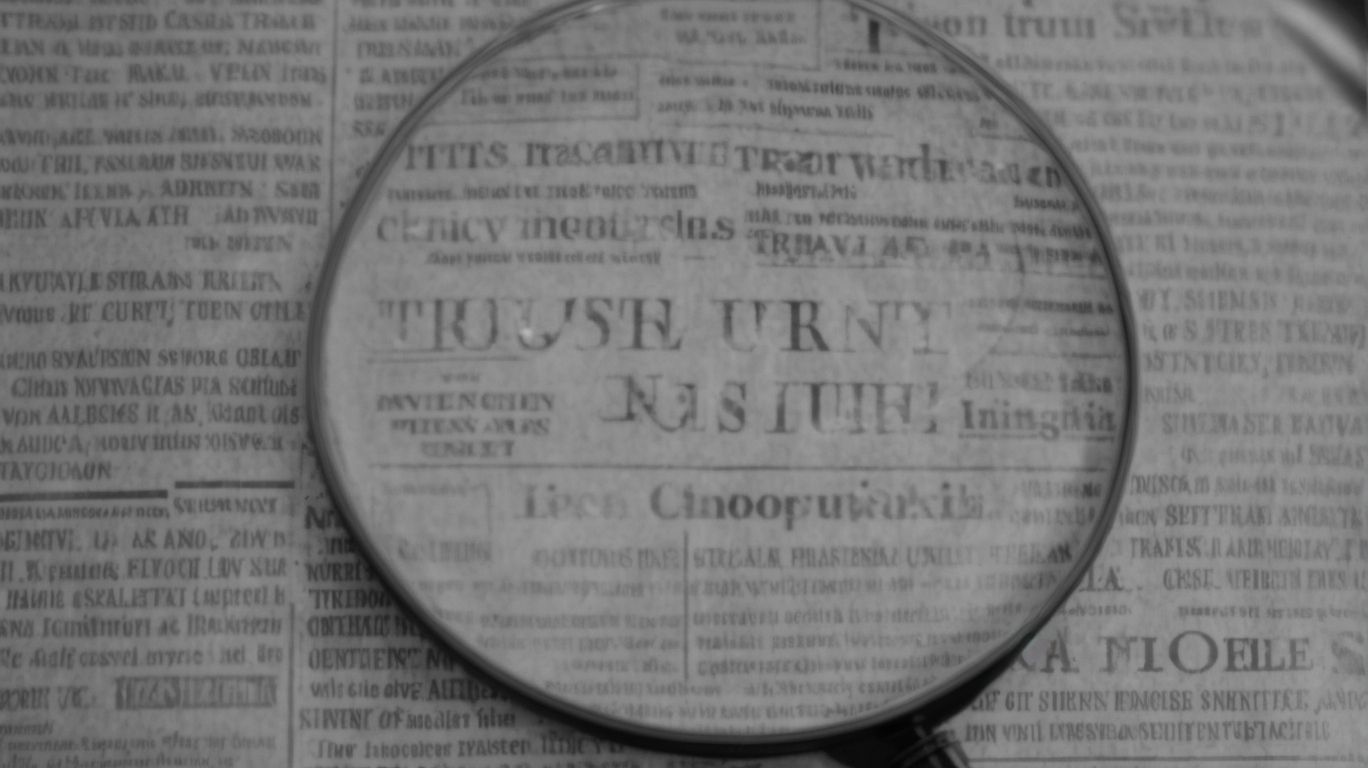

In the fast-paced world of media relations, building and maintaining trust and transparency are crucial for organizations to succeed.
This article delves into the importance of media relations, the role of transparency in building trust, and the ethics that should guide these interactions.
From understanding what trust means in media relations to tips for fostering transparency, this article provides valuable insights for organizations looking to navigate the complex landscape of media relations effectively.

Credits: Pressreleaselogic.Com – Sean Thompson
Media Relations is a crucial component of public relations that involves managing relationships between organizations and various stakeholders through communication strategies.
Effective media relations are essential for organizations to shape their public image, establish credibility, and maintain trust with their audiences. By leveraging various communication channels such as press releases, media pitches, and interviews, organizations can strategically engage with the media to disseminate key messages and respond to inquiries.
Successful media relations campaigns not only help organizations to reach a wider audience but also enhance their reputation and build long-lasting relationships with stakeholders. For example, the partnership between a renowned tech company and a popular tech publication resulted in increased brand visibility and positive coverage, contributing to a boost in consumer trust.
Media Relations plays a vital role in the success of organizations by facilitating effective communication with stakeholders, maintaining professionalism in interactions, and upholding integrity in all engagements.
Having strong media relations allows organizations to strategically shape their public image, ultimately impacting their reputation management. By effectively managing relationships with journalists and media outlets, organizations can ensure that accurate and positive information is disseminated, enhancing their credibility and trustworthiness in the eyes of the public.
In times of crisis, media relations can be crucial in managing the flow of information and addressing concerns promptly. Organizations with established relationships with the media are better equipped to navigate challenging situations and mitigate reputational damage through timely and transparent communication.
Moreover, ethical conduct in media interactions is paramount for maintaining long-term credibility and trust. Organizations that prioritize honesty, transparency, and respect in their media relations not only strengthen their reputation but also foster positive relationships with stakeholders, ultimately leading to enhanced engagement and support.

Credits: Pressreleaselogic.Com – Ralph Lee
Transparency is a cornerstone of effective media relations, fostering trust and credibility by ensuring open and honest communication practices between organizations and the media.
When organizations prioritize transparency in their media relations, they demonstrate a commitment to authenticity and accountability. This not only helps in building long-term relationships with journalists but also plays a crucial role in enhancing credibility with the public. By openly sharing information and being forthcoming about challenges or mistakes, organizations showcase a level of integrity that resonates with audiences.
Transparency is not just about providing information; it’s about embodying a culture of openness and ethical conduct. Companies like Patagonia and Buffer exemplify this through their transparent communication strategies. Patagonia’s approach of openly sharing their environmental impact reports and production processes has not only garnered positive media coverage but has also strengthened their credibility as a sustainable brand. Buffer, on the other hand, openly shares their revenue figures and employee salaries, illustrating their commitment to honesty and transparency.
Transparency in media relations refers to the practice of openly sharing information, disclosing relevant details, and maintaining ethical standards in all communications between organizations and the media.
This commitment to openness and honesty plays a vital role in fostering positive relationships with journalists and reporters. By being transparent, organizations not only build trust but also enhance the flow of information, enabling journalists to provide accurate and comprehensive coverage.
Transparency in media relations is essential for upholding ethical conduct and promoting accountability. Organizations that prioritize transparency are more likely to gain credibility and respect from the media and the public.
Transparency builds trust in media relations by demonstrating honesty, integrity, and a commitment to open communication, which fosters credibility with stakeholders and enhances the organization’s reputation.
Openness and clarity in media interactions enable organizations to establish a foundation of trust with their audience through genuine and ethical practices. When a company openly shares information and engages in transparent dialogue, it creates a sense of reliability and authenticity among stakeholders. This, in turn, leads to better rapport with journalists and media outlets, who value transparent and forthcoming sources.
For example, the global tech giant Apple has consistently emphasized transparency in its communication strategies, proactively addressing controversies or product issues through open communications. This approach has not only reinforced its credibility in the industry but has also garnered trust and loyalty from its customers and investors.
Several organizations have successfully demonstrated transparency in their media relations by promptly addressing issues, disclosing information openly, and engaging in honest communication practices.
For instance, Company X solidified its reputation by consistently providing accurate and timely updates during a recent industry crisis. By openly sharing details and progress reports, they enhanced credibility and trust with not just the media but also stakeholders and the public. This transparency not only mitigated potential damage but also strengthened their relationships across the board.
Similarly, in the financial sector, Company Y’s commitment to transparent communication was exemplified throughout their annual report release. By sharing detailed financial data and insights with complete honesty, they managed to bolster investor confidence and garner positive attention from media sources, leading to increased brand visibility and positive sentiment.

Credits: Pressreleaselogic.Com – Brandon Perez
Trust forms the foundation of successful media relations, underpinning strong relationships, enhancing credibility, and facilitating effective communication between organizations, the media, and stakeholders.
When trust is present in media relations, it serves as a vital glue that holds together the intricate web of interactions and information exchanges. Trust is the cornerstone that allows organizations to navigate the challenging terrain of public perception, media scrutiny, and stakeholder engagement with integrity and authenticity.
The trust that organizations build with the media directly impacts how their messages are perceived, the level of access they receive, and the overall tone of media coverage. By consistently demonstrating honesty, transparency, and reliability, organizations can earn the trust of journalists and news outlets, leading to more favorable coverage and increased opportunities for positive exposure.
Trust in media relations refers to the confidence and reliability that organizations, the media, and stakeholders place in each other, based on consistent, honest, and ethical communication practices.
Building trust in media relations is essential for fostering strong, enduring relationships. When organizations are transparent and truthful in their interactions with the media, stakeholders perceive them as reliable and credible sources of information. This often leads to positive media coverage, favorable public opinion, and enhanced brand reputation.
One classic example of trust building in media relations is when a company promptly addresses a crisis by being forthcoming about the situation, taking responsibility, and implementing corrective actions. By handling the issue transparently and authentically, the organization demonstrates commitment to ethical conduct and earns trust from both the media and the public.
Trust profoundly influences the dynamics of media relations by shaping perceptions, influencing coverage, and determining the level of credibility an organization maintains with the media, stakeholders, and the public.
Trust is analogous to the foundation of a strong building in the realm of media relations. When media outlets and stakeholders trust an organization, they are more inclined to give fair and accurate coverage, portraying the organization positively. This trust extends beyond mere transactions to encompass a deep-seated faith in the integrity and reliability of the organization. A well-established trust can serve as a shield during times of crisis, allowing the organization to weather challenges with credibility and resilience.
Organizations that have cultivated trust in their media relations have benefited from positive media coverage, enhanced stakeholder relationships, and a reputation for integrity and reliability.
For instance, a leading consumer goods company implemented a transparent communication strategy that emphasized honesty and accountability in all interactions with the press. This commitment to openness resulted in increased favorable media attention, as journalists trusted the company’s sincerity and accuracy.
A global tech firm focused on building long-term relationships with key stakeholders through regular engagement and feedback mechanisms. This approach not only improved media relations but also fostered a loyal network of advocates who supported the company during challenging times.

Credits: Pressreleaselogic.Com – Terry Allen
Ethics form the moral compass of media relations, guiding professionals to act in the public interest, uphold integrity, and maintain transparency and honesty in all communication efforts.
One core ethical consideration in media relations is ensuring that the information shared is accurate and truthful, even when faced with pressures to sensationalize or manipulate facts for the sake of a story. Professionals need to strike a balance between serving the public’s right to know and avoiding harm or misinformation.
For instance, when handling confidential information, determining what should be disclosed in the interest of transparency without violating privacy rights can pose a challenging ethical dilemma. By establishing clear guidelines and codes of conduct, organizations can navigate such situations with ethical integrity.
Ethics are crucial in media relations as they ensure that professionals act responsibly, prioritize the public interest, uphold integrity, and maintain credibility through honest and ethical communication practices.
One significant aspect of ethical media relations is safeguarding the public interest by providing accurate information, avoiding sensationalism, and respecting privacy boundaries.
When media professionals prioritize sensationalism over accuracy, for instance, by sensationalizing news stories for higher ratings, audiences may be misled, and trust can be eroded. This can lead to severe consequences where public perception of an organization or individual is negatively impacted, resulting in damaged reputation and credibility.
Media relations professionals often face ethical challenges related to conflicts of interest, responsibility to the public, honesty in communication, and balancing organizational objectives with ethical considerations.
When caught in a conflict where personal gain interferes with transparency, it’s crucial to prioritize the **public interest** above all else. Striking a delicate equilibrium between satisfying stakeholders’ needs and upholding integrity demands a proactive approach. In such instances, diversifying communication strategies can help maintain credibility and foster trust with varied audiences. Cultivating a culture of **accountability** within the team can prevent potential ethical lapses and ensure that ethical guidelines remain a cornerstone of every media interaction.
Maintaining ethical standards in media relations requires a commitment to professionalism, integrity, fairness, and transparency in all interactions with the media, stakeholders, and the public.
For uphold these standards effectively, it is crucial for individuals and organizations to establish clear guidelines and protocols for communication. Setting expectations from the outset can help prevent potential ethical pitfalls that may arise during media engagements.
Building transparency and trust in media relations requires a commitment to honesty, open communication, and ethical conduct to enhance relationships with the media, stakeholders, and the public.
For achieve this, organizations must prioritize clear communication channels that convey accurate and relevant information to the media and the public. Crafting compelling and factual narratives that resonate with journalists and audiences alike can help establish credibility and foster trust over time. Actively engaging with journalists, listening to their feedback, and addressing any concerns they may have can build stronger, more collaborative relationships. Implementing transparent practices such as disclosing conflicts of interest, citing sources, and providing context can further solidify an organization’s reputation for honesty and integrity in media interactions.
Honesty and openness are fundamental in building trust and transparency in media relations, as they demonstrate a commitment to ethical conduct and integrity in all communications.
When organizations prioritize honesty in their interactions with the media, it not only establishes a foundation of trust but also enhances their reputation. For instance, being transparent about a setback or mistake, instead of trying to cover it up, can lead to a more favorable response from both journalists and the public. This approach showcases authenticity and a willingness to take accountability, which can significantly bolster the credibility of the organization.
Clear and consistent communication is essential for building transparency and trust in media relations, ensuring that messages are conveyed accurately, openly, and in a timely manner.
When organizations prioritize clear and consistent communication, they establish a solid foundation for strong relationships with the media and stakeholders. By being transparent and forthcoming in their messaging, they can earn credibility and build lasting trust. To achieve this, it is crucial for organizations to craft messages that are easily understood, avoiding jargon or complex language that may obscure the intended meaning. Consistency in communication style and tone helps reinforce the organization’s values and key messages, creating a coherent brand identity.
Addressing and correcting mistakes openly and promptly is key to building trust and credibility in media relations, demonstrating accountability and a commitment to ethical conduct.
When an organization openly acknowledges errors, it showcases a culture of honesty and integrity, which can foster strong relationships with the media and stakeholders. Transparency in crisis communication can mitigate reputational damage and maintain a positive image in the eyes of the public. For instance, in 2016, Samsung faced a crisis with the Galaxy Note 7 batteries catching fire. By swiftly recalling the product, apologizing, and implementing stringent quality control measures, they restored trust and regained market confidence.
Respecting confidentiality in media relations is crucial for building trust and maintaining transparency, as it demonstrates professionalism, integrity, and a commitment to protecting sensitive information.
Guidelines for handling sensitive information in media relations involve fostering a culture of discretion and safeguarding data through secure channels. Confidentiality not only honors privacy agreements but also ensures that information shared is treated with the respect it deserves. By upholding these principles, organizations can avoid breaches of trust and potential legal implications. Upholding confidentiality not only benefits the media but also builds a reputation for ethical conduct and reliability, strengthening relationships with stakeholders and fostering a climate of mutual respect.
Cultivating strong relationships with journalists and media outlets is essential in media relations to foster mutual understanding, cooperation, and credibility in communications.
Organizations can establish and nurture these vital connections by adopting a proactive approach. One effective strategy is to tailor pitches and press releases to suit the specific interests of target journalists and media platforms. This personalized outreach not only demonstrates a genuine interest in the recipient’s work but also increases the likelihood of coverage. Engaging in collaborative projects or offering exclusive opportunities for media engagement can further solidify these relationships and enhance the organization’s reputation within the industry.
Transparency and trust are essential components of ethical media relations. It is important for media outlets and organizations to be transparent in their communication and conduct, as it builds trust with their audience and maintains the integrity of the information being shared.
Media outlets can practice transparency by clearly stating their sources, verifying information before publishing, and disclosing any conflicts of interest. This helps to maintain trust with their audience and avoids potential ethical issues.
Ethics play a crucial role in media relations as they guide the behavior and decision-making processes of journalists and media organizations. Adhering to ethical standards ensures that information is presented accurately and fairly, and that the public’s trust is not compromised.
Media relations professionals can build trust by being transparent and honest in their communication, providing accurate and unbiased information, and responding to feedback and criticism in a timely and respectful manner. This helps to establish a positive relationship with the audience and fosters trust in the organization.
Violating ethical standards in media relations can have serious consequences, such as damaging the reputation of the media outlet or organization, losing the trust of the audience, and facing legal repercussions. It can also lead to a decline in readership or viewership, ultimately affecting the success and sustainability of the media source.
Media organizations can promote transparency and trust by implementing clear ethical guidelines, providing training and resources for their employees, and holding themselves accountable for their actions. They can also involve the audience in the process by soliciting feedback and addressing any concerns or questions about their reporting and practices.
Leave a Message Bottom Right
We Reply Fast